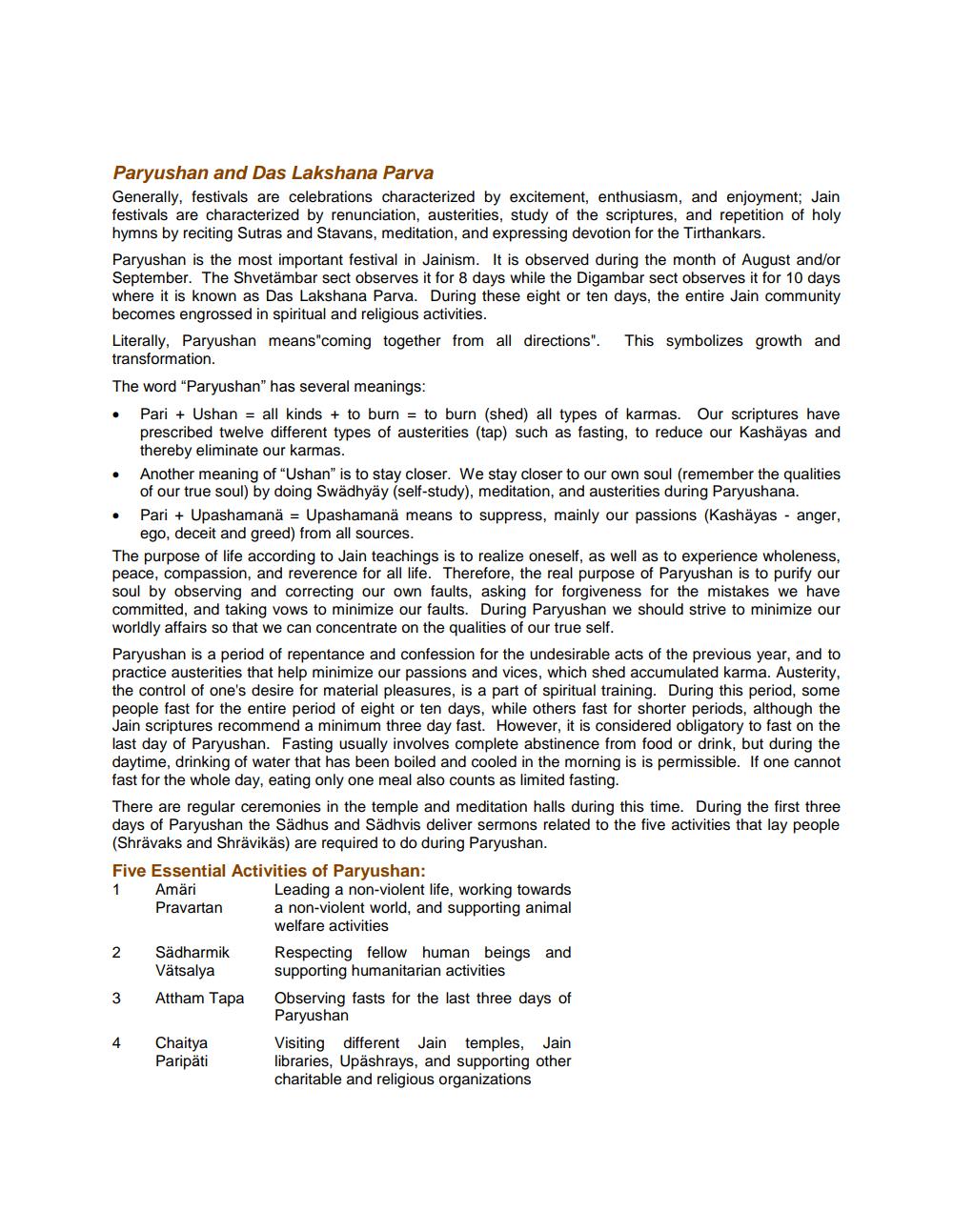Book Title: Paryushan and Das Lakshana Parva Author(s): Pravin K Shah Publisher: JAINA Education Committee View full book textPage 1
________________ Paryushan and Das Lakshana Parva Generally, festivals are celebrations characterized by excitement, enthusiasm, and enjoyment; Jain festivals are characterized by renunciation, austerities, study of the scriptures, and repetition of holy hymns by reciting Sutras and Stavans, meditation, and expressing devotion for the Tirthankars. Paryushan is the most important festival in Jainism. It is observed during the month of August and/or September. The Shvetämbar sect observes it for 8 days while the Digambar sect observes it for 10 days where it is known as Das Lakshana Parva. During these eight or ten days, the entire Jain community becomes engrossed in spiritual and religious activities. Literally, Paryushan means "coming together from all directions". This symbolizes growth and transformation. The word "Paryushan" has several meanings: Pari + Ushan = all kinds + to burn = to burn (shed) all types of karmas. Our scriptures have prescribed twelve different types of austerities (tap) such as fasting, to reduce our Kashayas and thereby eliminate our karmas. Another meaning of "Ushan" is to stay closer. We stay closer to our own soul (remember the qualities of our true soul) by doing Swadhyay (self-study), meditation, and austerities during Paryushana. Pari + Upashamanä = Upashamana means to suppress, mainly our passions (Kashäyas - anger, ego, deceit and greed) from all sources. The purpose of life according to Jain teachings is to realize oneself, as well as to experience wholeness, peace, compassion, and reverence for all life. Therefore, the real purpose of Paryushan is to purify our soul by observing and correcting our own faults, asking for forgiveness for the mistakes we have committed, and taking vows to minimize our faults. During Paryushan we should strive to minimize our worldly affairs so that we can concentrate on the qualities of our true self. Paryushan is a period of repentance and confession for the undesirable acts of the previous year, and to practice austerities that help minimize our passions and vices, which shed accumulated karma. Austerity, the control of one's desire for material pleasures, is a part of spiritual training. During this period, some people fast for the entire period of eight or ten days, while others fast for shorter periods, although the Jain scriptures recommend a minimum three day fast. However, it is considered obligatory to fast on the last day of Paryushan. Fasting usually involves complete abstinence from food or drink, but during the daytime, drinking of water that has been boiled and cooled in the morning is is permissible. If one cannot fast for the whole day, eating only one meal also counts as limited fasting. There are regular ceremonies in the temple and meditation halls during this time. During the first three days of Paryushan the Sädhus and Sadhvis deliver sermons related to the five activities that lay people (Shrävaks and Shrävikäs) are required to do during Paryushan. Five Essential Activities of Paryushan: Amari Leading a non-violent life, working towards Pravartan a non-violent world, and supporting animal welfare activities Sädharmik Respecting fellow human beings and Vätsalya supporting humanitarian activities Attham Tapa Observing fasts for the last three days of Paryushan Chaitya Visiting different Jain temples, Jain Paripäti libraries, Upäshrays, and supporting other charitable and religious organizationsPage Navigation
1 2 3
